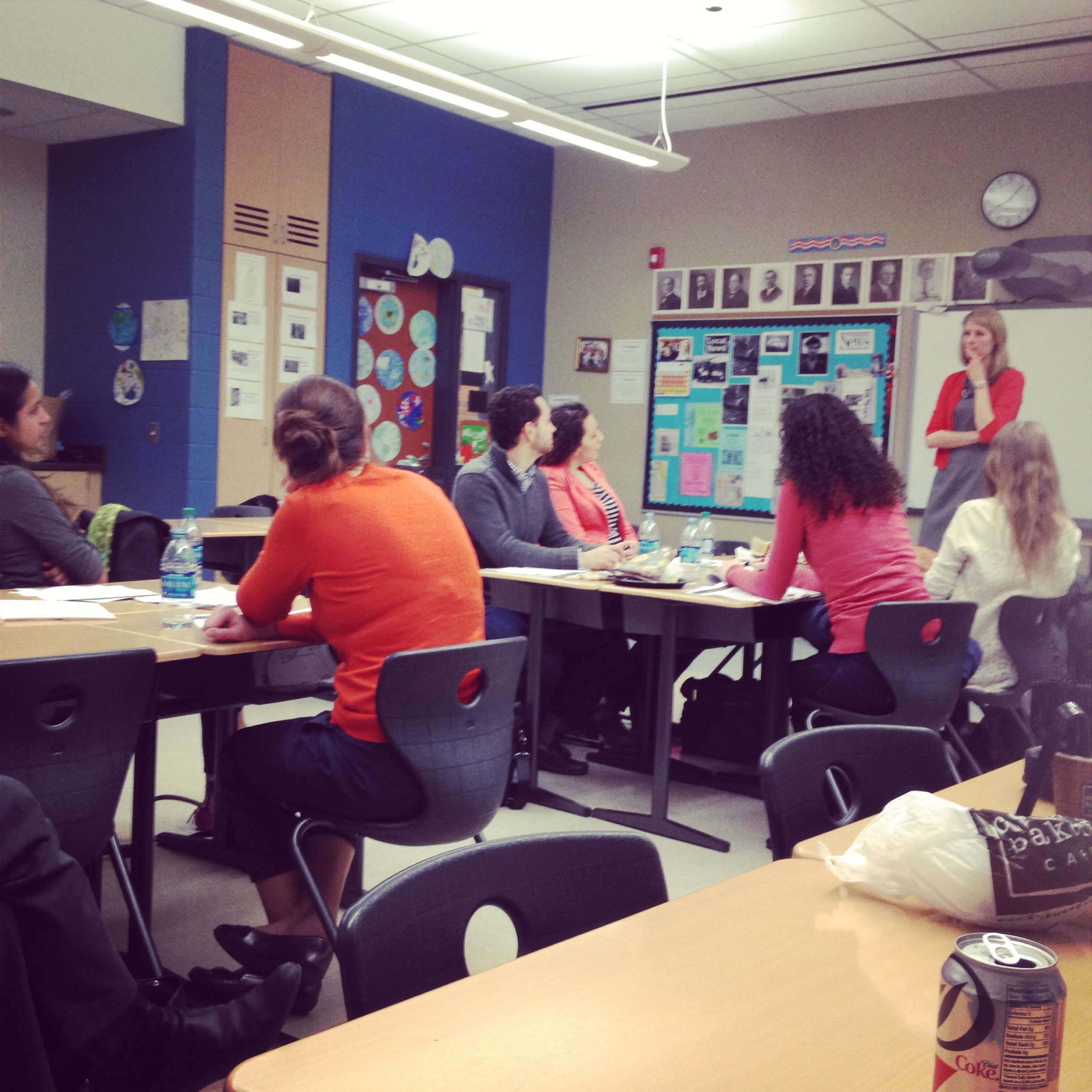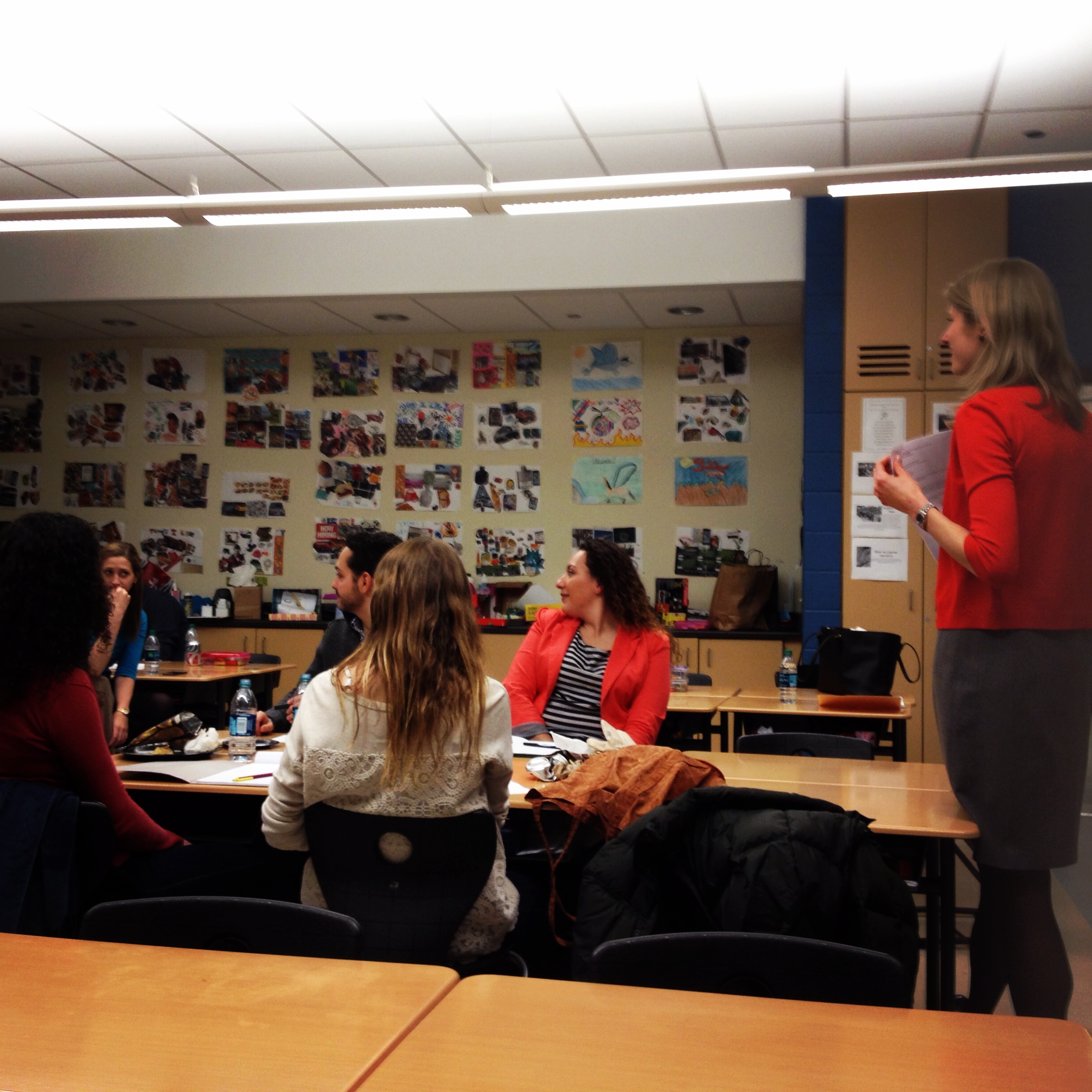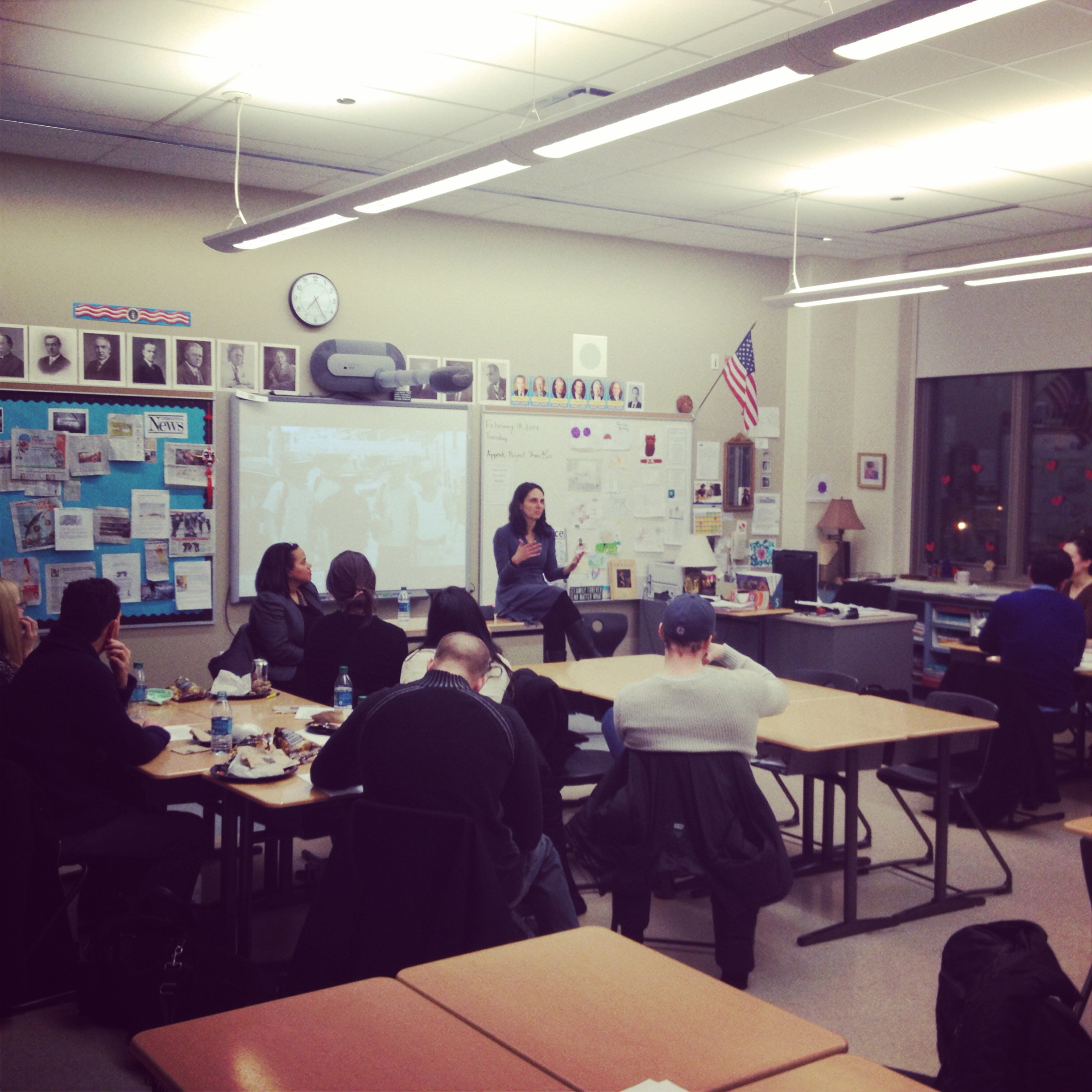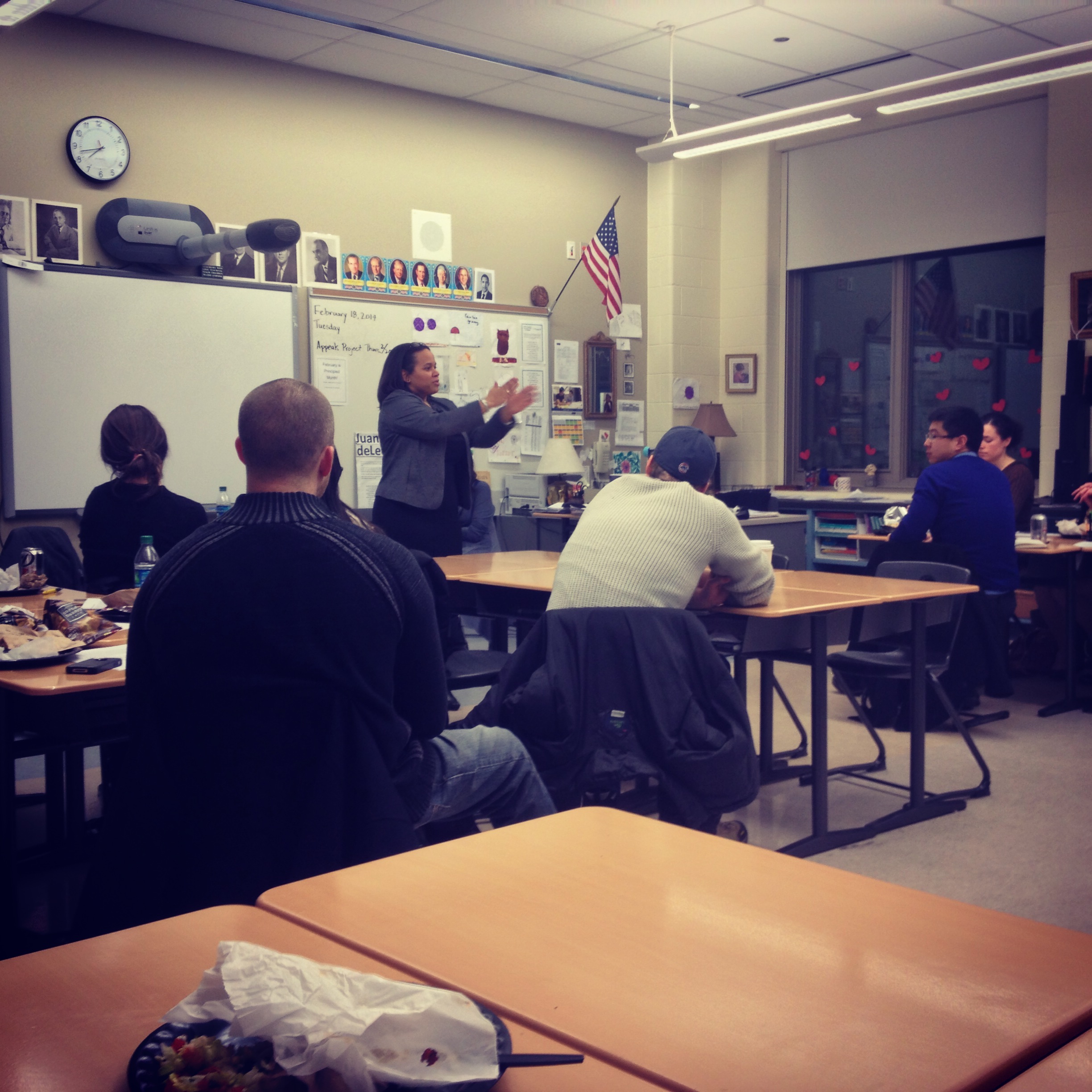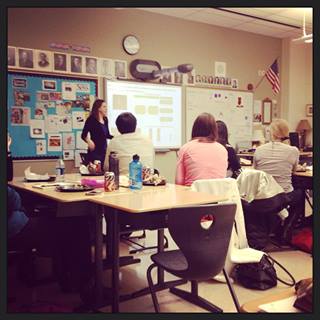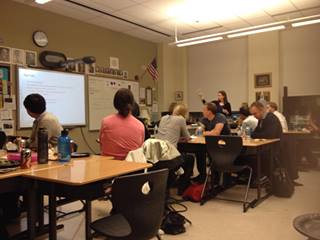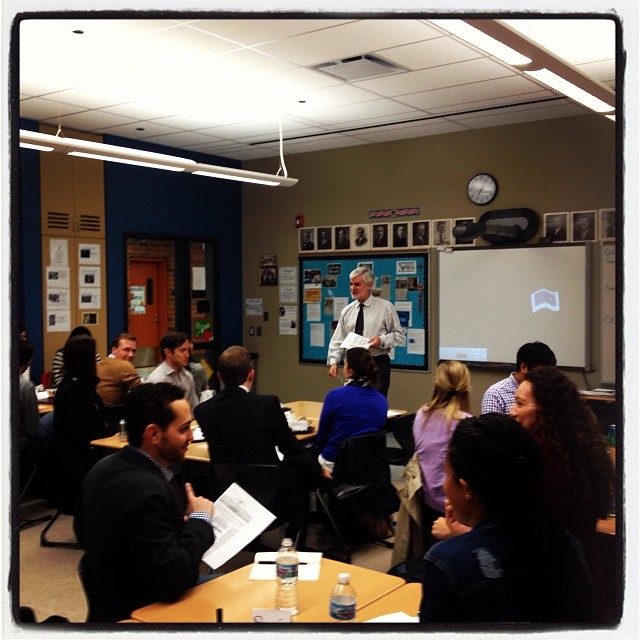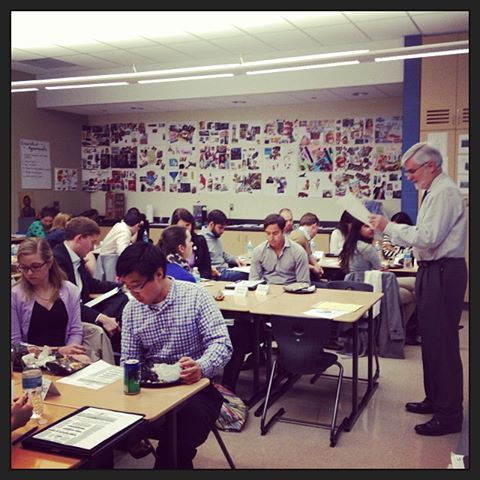Education
Revive the Dream: April Session with Teach for America and Josh Anderson
 Just a few weeks ago, I organized and hosted the April session for Revive the Dream.  Our 2013 Fellows were lucky to spend the evening with Josh Anderson, a long-time Executive Director of Teach for America. The topic of the evening was talent in the education field.
Just a few weeks ago, I organized and hosted the April session for Revive the Dream.  Our 2013 Fellows were lucky to spend the evening with Josh Anderson, a long-time Executive Director of Teach for America. The topic of the evening was talent in the education field.
We kicked off the session discussing Josh’s background as well as the reading. To prep for ourdiscussion, I sent a few articles to the group in advance of the session.
1. Mckinsey study:Â Closing the Talent Gap
2. New Schools study: Principal Effectiveness
The discussion around talent in the education space is always hot topic. On one hand everyone knows about the importance of having great teachers and inspiring leaders in the education space. After all, strong leaders can often change everything for students, especially those on the cusp.  Students who don’t have enough resources at home. Students who might be behind a grade or two. And students who need someone to ignite the fire within them.
 That said, the incentives to enter the education space, especially as a teacher aren’t always great. Not only is the pay lower than a majority of other fields, but the prestige is also lower. Furthermore, the work can be hard and grueling and at times it feels like you can’t have an impact if you’re in a big school sytem.
That said, the incentives to enter the education space, especially as a teacher aren’t always great. Not only is the pay lower than a majority of other fields, but the prestige is also lower. Furthermore, the work can be hard and grueling and at times it feels like you can’t have an impact if you’re in a big school sytem.
On the other hand, we can look to countries like Finland that have figured out the dilemma. Countries who attract and retain the most promising people to enter into teaching programs.  Countries that not only pay them well but also provide them with a platform to make change. One program that does that in the US is Teach for America. They recruit the best and the brightest undergrads to teach in underserved schools but the program’s main criticism is that the teachers rarely stay in the field and in the profession. We addressed that and much more in our discussion with Josh.
 Thanks to people like Josh, who are working on these issues not just in Chicago but beyond Chicago as well. And Josh/TFA, thanks again for supporting the RTD program.
Thanks to people like Josh, who are working on these issues not just in Chicago but beyond Chicago as well. And Josh/TFA, thanks again for supporting the RTD program.
Revive the Dream: Session 6 with OneGoal and Sarah Berghorst
 Just a few hours ago, I hosted the March session for the Revive the Dream Program.  The RTD program fellows were lucky to spend the evening with Sarah Berghorst, Executive Director of OneGoal in Chicago.  The topic of the evening was college persistence, particularly in Chicago.
Just a few hours ago, I hosted the March session for the Revive the Dream Program.  The RTD program fellows were lucky to spend the evening with Sarah Berghorst, Executive Director of OneGoal in Chicago.  The topic of the evening was college persistence, particularly in Chicago.
We kicked off the session discussing how we would be placing the Fellows next year before Sarah got to the room. To prep for that discussion, I sent a few articles to the group in advance of the session, including these below discussing college persistence and OneGoal’s most recent success.
Article 1: Chicago TribuneÂ
Article 2: The AtlanticÂ
Sarah came in right as we finished up. Â And she led the discussion for the next 90 minutes.
The discussion around college persistence among low income students is always a good one.  The discussion tends to go something like this.  On the positive side, going to college is an extremely important option for low income students.  Historically, going to college has been the best way to change the trajectory of the lives of first generation students.  It gives students access to things they’ve never seen before.  It prepares students to succeed professionally and live a more fulfilling life.  And it provides them with a more legitimate chance to compete in our ever changing but ever more unequal economy.
On the other hand, many people think that this is easier said than done. That low income students facing larger hurdles when trying to get to college. That money may be better spent in early education if you want to maximize the statistical impact. And that the value of college is changing; that a college degree is no longer a clear predictor of success. These are all tough questions; but also questions that Sarah fielded and the fellows discussed.
Thanks to people like Sarah and my friend Jeff Nelson (founder of OneGoal) who are working on these issues not just in Chicago but beyond Chicago as well.  And thanks again for supporting the RTD program.
As a side note, please consider attending OneGoal’s Gala on May 6, 2014. I plan to be there.
Revive the Dream: Session 5 with Melinda Spooner and Melissa Zaikos
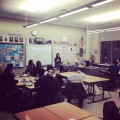 Just yesterday, we hosted the fifth session for the Revive the Dream Fellows Program. Our Fellows were lucky to spend the evening with Melinda Spooner (Executive Director of Achievement Network) and Melissa Zaikos (CEO of Intrinsic Charter Schools).  The topic of the evening was Technology and the Common Core.
Just yesterday, we hosted the fifth session for the Revive the Dream Fellows Program. Our Fellows were lucky to spend the evening with Melinda Spooner (Executive Director of Achievement Network) and Melissa Zaikos (CEO of Intrinsic Charter Schools).  The topic of the evening was Technology and the Common Core.
The discussion about Common Core is always a good one no matter what side of the fence you sit on. We kicked off the session discussing the Pros and Cons before the speakers got to the room to get the discussion going. To prep for that discussion, I sent a few articles to the group in advance of the session, including these below:
New York Times article on the common core
The Atlantic article  on the Schoolmaster
USA Today Article on Bill Gates  and the Myths of the common core
The debate goes something like this:
On the positive side, the Common Core standards will allow states to know how they are doing. They can compare standardized test scores against other states, increase the standards and rigor in the classroom. This means that the student should be better prepared for college and likewise, it means that over time all states will theoretically have the same level or rigor, so if a student moves to a new city, county or state, the level of education elsewhere will be simillar.
On the other hand, many people think that this is easier said than done. That the execution is not only difficult but perhaps impossible. Not only will the standard be a tough adjustment for students but also for the teachers initially. It is not the way many teachers are used to teaching and now they are being asked to change their style and content and get evaluated on it. Likewise it’s also not the level of learning students have been asked to do for the past three decades.  Moreover, there is not a good plan in place for students with special needs and the standards don’t do much to account for different starting points of students.
On the other hand, some people remained optimistic, understanding these challenges are similar to those that come with running any school, and making change in the education space. They realize that there is a lot of work to be done, and increasing standards of learning is one step we need to get there, among others.
We talked about all of these hard topics and more in our session last night with Melinda and Melissa. Thanks to programs like Revive the Dream  and Education Matters we hope to continue to help spread ideas about the issues equip up and coming leaders to solve these education issues over time.
Thanks to Melinda and Melissa for coming to speak to our Fellows.
* Below is a photo of Melissa Zaikos speaking to the group about her time at CPS and her role as CEO at Intrinsic Schools
* Below is a photo Melinda Spooner speaking to the group about her role as Executive Director of the Achievement Network in Chicago.
#AskJeremy: Advice on Real Estate Programs and the GMAT
![]() In a recent question, a reader in New York asked me asked a question about real estate programs and the GMAT.
In a recent question, a reader in New York asked me asked a question about real estate programs and the GMAT.
As usual, I did this during my first take. Given the size of the question, I kept my response fairly brief. If anyone has any follow up questions, feel free to send them my way. See below for the question and below that for my response.
Good day Jeremy Wilson, this is Ezra. Hope your Thanksgiving week went well with family. Thank you for the advice on career advancement when we met at Cornell University’s Information Session in Fall 2008. I have decided to pursue obtaining my masters in real estate development finance. To help me move forward in taking the next steps, any advice on courses, study materials and resources for preparing for the Graduate Management Admissions Test (GMAT) would be greatly appreciated. I thank you in advance for information provided on the subject.
Professionally,
Ezra
Here is my video response.
embedded by Embedded Video
YouTube Direkt
High level summary:
1. You’ll have to choose between MBA programs where you can study real estate/finance or Masters in Real Estate finance programs.
2. Â MBA programs (despite being a great launching pad) can provide challenges as most don’t have large real estate programs and you’ll have to convince employers/real estate firms that you really want to do it.
3. The program you choose will determine the test you take.
4. Â If you end up taking the GMAT, many people who do well take classes. Â I took Manhattan GMAT as did a number of others I know.
5. Â It’s also a good idea to mix resources. One thing I did and like to recommend is to use a book from another GMAT company. That book will probably ask questions differently than the format of the class you’re taking. This will make you more prepared for the range of questions/styles that could come up.
6. Â Remember to be organized with how you study, to understand what parts you need to work on and that all sections are not weighted equally.
As always, let me know if you have any more questions!Â
Happy New Year!
#EducationMatters #AskJeremy
Revive the Dream: Session 3 with Adam Anderson of Chicago Public Schools
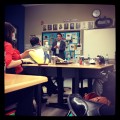 Just yesterday, we hosted the third session for the Revive the Dream Fellows Program. Our Fellows were lucky to spend the evening with Adam Anderson.  During the session, the Fellows discussed Chicago Public Schools (CPS), the school closings in early 2013 and Adam’s role as Officer of Portfolio, Panning and Strategy.
Just yesterday, we hosted the third session for the Revive the Dream Fellows Program. Our Fellows were lucky to spend the evening with Adam Anderson.  During the session, the Fellows discussed Chicago Public Schools (CPS), the school closings in early 2013 and Adam’s role as Officer of Portfolio, Panning and Strategy.
The discussion about CPS is always a good one no matter what side of the fence you sit on. The decreasing (yet still very large) budget, the organization’s most important priorities, increases in class size and student social-economic backgrounds are some of the most compelling topics.
Some people think CPS is getting it all wrong. They point to increasing class sizes, decreasing budgets, abismal test scores, and shutting down a few dozen schools last year. On the other hand, some people are more optimistic, understanding the challenges that come with running any school, and especially a pubic school in Chicago. They realize that the class sizes and teacher salaries are the result of budget cuts, balance sheet deficits and not enough talented people entering the education space. They also understand the hard work that it takes to move the needle just a little and the difficulty the students face not just in the classroom, but at home far before they ever step foot in the classroom.
We talked about this and more in our session last night with Adam.
As pre-reading for the session, I assgined the Fellows a popular trending article, The Invisible Child has been trending lately (I highly recommend reading this article). This was a perfect pre-read to get your mindset on some of the realities faced in urban districts. I kicked off the session by doing some simple discussion of the article and student life in rural districts in the United States. We talked about the harsh realities of homelessness and the struggles that some kids face before stepping foot in the classroom, and we also brainstormed ideas to solve the problems.
Easier said than done of course. And that’s why programs like Revive the Dream exist. To bring more people together to understand that Education Matters for students in urban districts and to help equip them solve these education issues.
Thanks to Adam for coming to speak to our Fellows. We look forward to staying in touch.
Revive the Dream: Session 2 with Micki O’Neil
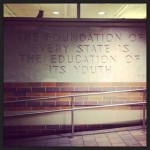 Earlier this week, we hosted the second Revive the Dream seminar. Our Fellows were lucky to spend the evening with charter school founder and former Teaching Fellow, Micki O’Neil.  The issue we discussed, is whether kids in charter schools are better off than kids in traditional public schools.
Earlier this week, we hosted the second Revive the Dream seminar. Our Fellows were lucky to spend the evening with charter school founder and former Teaching Fellow, Micki O’Neil.  The issue we discussed, is whether kids in charter schools are better off than kids in traditional public schools.
The debate is a good one. Some people argue yes, pointing to top charter schools in Chicago, such as KIPP and Noble. Likewise, people also point to the higher average high school graduation rate. On the other hand, there are also others who argue that kids are not better off in charter schools as a whole, arguing that there are more bad charter schools than good ones, that there isn’t enough data to demonstrate college graduation or general success, and that student performance on tests and homework in chartersoften times isn’t any better than their public school counterparts.
About a year ago this panel discussed the issue.  It’s worth the watch if you have an extra hour. The panelists ranged from the President of the Illinois Charter Network (“INCS”), who you might guess was an advocate of the charter system, to a member (or former member) of the Teachers’ Union, to Professors Charles Payne a more neutral voice, from the Unviersity of Chicago.
Thanks to Micki for graciously accepting our invite to visit and talk in more detail about the charter debate as well as discuss her model at the charter school she recently founded, Foundations College Prep.
Here are a few photo shots from the session.
*This is Micki discussing her charter model at Foundations Prep
* This is Micki presenting stats on charter schools versus CPS
Revive the Dream: Session 1 with John Horan
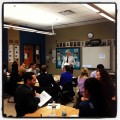 I was lucky enough to spend the evening with 22 extraordinary people from around Chicago.  They are part of the new Revive the Dream cohort I helped recruit, and program that I’ll be organizing/managing this year. I’ll be sharing some of the Fellows experiences along the way.
I was lucky enough to spend the evening with 22 extraordinary people from around Chicago.  They are part of the new Revive the Dream cohort I helped recruit, and program that I’ll be organizing/managing this year. I’ll be sharing some of the Fellows experiences along the way.
In the meantime, you can see a few photos I took last night along with many of the talented folks in the program.  We also had the pleasure of having charter school founder John Horan join us for part of the session.  Lots of really great things to come so stay tuned.
This is a photo of one of our guest speakers John Horan. I am glad he accepted our invite.
This is a photo of our Fellows at work. They were looking at Chicago stats for persistence through college. Looks like we picked a great class.
Meeting my readers
 I don’t do it often as I want, but I really enjoy meeting my readers.
I don’t do it often as I want, but I really enjoy meeting my readers.
I’ve had the chance to meet many of them. In Chicago, Atlanta, Phoenix, New York and the Bay. But also in countries like Kenya.
Today, I had the chance to meet one of my favorite readers. We’ve been trying to meet up for a few weeks and it finally happened.
He just graduated college and had a lot of really great energy, not to mention questions about the world. He came prepared with a list of questions, but we didn’t get to most of them.
I think that meeting my readers remains one of the best ways to help hear more about the things students and professionals are thinking about and what their stories are. What they think about work, how they think about grad school and education, and what impact they want to make in their lifetime.
It also helps me hear about the things they fear. Â The fear of making sales calls, fear of getting rejected and fear of failing at what they do. Â And so I like to talk a lot about how to overcome that. Â We come up with plans so they can see a path to figuring out how to make it more likely that they will succeed.
But here’s the real secret. Â The hard is part isn’t defining the path or coming up with a plan, that’s the easy part. Unfortunately, it’s the part most consultants and advisors focus on. Â The hard part is doing the scary thing of taking a stand and sticking to the path. Â And so that’s where I like to focus. And it made for a really fun conversation today.
If any of you are interested in chatting, please let me know. I’d love to hear from you.
But before you  write, check out Education Matters Project. Most people I talk to tend to want to support the cause by sharing their story about why education matters to them.
Nothing is for everyone
 You know this but you ignore it every single time. Â And you always find out the hard way.
You know this but you ignore it every single time. Â And you always find out the hard way.
If you’re fundraising for Catholic Extension in Chicago, you have to ask yourself, why does it matter what the atheist next door thinks about your phone strategy?
If you’re a marketing executive at Target, why does it matter what loyal shoppers at Neiman Marcus think about your new products?
Or if you’re applying to college from the poorest schools in one of the poorest neighborhoods in the world, then why are you trying to please the admissions committees from colleges who don’t care about your story.
We all know this but we always seem to forget, that nothing is for everyone.
Think about it. The vast majority of people in the world have never sat in a Starbucks and never used an Android. Likewise the vast majority of people in many parts of Asia do not have indoor plumming.  The numbers show this very clearly.  Just because you have it, doesn’t mean everyone else does.  And the sooner we understand this, the more time we can spend focusing on ways to have more impact in the world by pleasing the people who do care.
In the end, you’re more likely to succeed if you say, this is what I stand for. And this is what I believe. If it’s not for you, then I’ll find the other people who believe in my story.
In short, ignore the skeptics. And spend more with the people that believe.
Revive the Dream: Join us in Chicago
 An underserved education system results in increased poverty, higher prison rates, systemic inequality, and in the end an economy that is worse off. One organization I am working with to help tackle the issues in Chicago is Revive the Dream.
An underserved education system results in increased poverty, higher prison rates, systemic inequality, and in the end an economy that is worse off. One organization I am working with to help tackle the issues in Chicago is Revive the Dream.
Over the upcoming year, I’ll be working with my friend Meg as an organizer for Revive the Dream fellows program.
RTD’s mission is to revive the American dream for underserved children. We do that by recruiting emerging social leaders and giving them access to a curriculum, to leaders and to organizations that can develop them into reformers not just in Chicago but across the U.S. when they are done.
In short, we’ll be bringing together a group of fellows in 2013, bringing in education leaders in Chicago to speak at our sessions, and then helping people get connected to special projects with education nonprofits after the sessions are over.
Interested in being a fellow? We are currently recruiting for our 3rd cohort.
You can also email with questions or to hear about our next happy hour in early September.
There’s never been a more pivotal time to develop leaders in the education space. Please help us spread the message.
Guest Post by Varsity Tutors: How to improve your score on the GMAT [or any test]
 Any friends studying for a standardized test these days?  Then this guest by my friends at Varsity Tutors could be for you. Whether you’re studying for the LSAT, GMAT, GRE or the SAT, these general tips may be helpful on your second attempt.  More importantly,  they reinforce the idea of just how much #EducationMatters.
Any friends studying for a standardized test these days?  Then this guest by my friends at Varsity Tutors could be for you. Whether you’re studying for the LSAT, GMAT, GRE or the SAT, these general tips may be helpful on your second attempt.  More importantly,  they reinforce the idea of just how much #EducationMatters.
See below for the article.
How to Improve Your GMAT Score
“B-School applicant, you just finished a grueling four-hour test. What are you going to do now?â€
“I’m going to…take it again!â€
Well, that wasn’t the answer everyone was expecting. However, retaking the GMAT is a reality for many test-takers. Some simply feel they could have done better than they did, others need a certain target score to get into a particular school that they have not yet reached. In fact, students are often encouraged to initially sign up for two tests, hoping that a scheduled second test will take some pressure off of them the first time, ultimately leading to better scores.
If you have a solid reason to take the exam again, get the test date locked down as soon as you can. You have to wait 31 calendar days before retaking the GMAT, but in the interest of keeping your knowledge fresh, you shouldn’t schedule your retake too far after that time.
So, you’ve got a month or so before another test day, and you need a plan. It’s time to figure out what to do so that this extra effort expended will not go to waste.
1. Review your initial test day experience immediately.
As much as you probably don’t want to relive an experience that you possibly found about as fun as dental surgery, an immediate debrief is a necessary evil. As soon as possible, go back over your entire test day experience and take notes.
- Remember your physical condition. If you were sleepy, felt hungry, or were uncomfortable in any other way, these circumstances could very well have messed up your score. Thankfully, they can all be fixed for your retake.
- Remember conditions of the room. Things like temperature and noise can also affect you negatively, and you can be better prepared for them next time.
- Remember your actual test-taking. Timing and concentration during long reading passages are examples of important concepts that should be always incorporated into your preparation. Did you have problems with these the first time?
- Remember the test content. There may have been specific concepts, vocabulary, or problem types that were vague or unknown to you and that, to your dismay, popped up repeatedly. Jot them down so you can work on them, since it’s likely that they are important and you will see them again.
2.  Take a short break.
Once you’ve immediately recapped the day, it’s time to shake it off and move forward with the lessons you’ve learned. It’s important to give your mind a little bit of time off and put some distance between you and the first test.
3. Address your weaknesses.
When you analyze your test day experience, look at the items that you saw consistently and didn’t feel confident approaching. Hit those hard by doing drills and in-format questions until they are no longer a problem.
4. Shore up your strengths.
Don’t let the things that you are good at fall by the wayside. Instead, keep them fresh by continuing to work on them while simultaneously reviewing the more challenging material as well. And, in all question cases (but particularly when you’re trying to keep your good skills fresh), go over both correct and incorrect answer choices. You may have answered the question right, but was there a faster way to do it? Is there any lesson shown in the wrong answers that you could use regarding eliminating wrong answers in the future?
5. Work on time management.
Time management is a big problem for most test-takers, so don’t neglect it. You’ve got to improve how quickly you get correct answers and how much time to spend on questions before giving up on them or guessing. Once you have concepts down, complete timed problem sets and exercises as soon as possible.
6. Change it up.
The results of your first test were clearly subpar for you, so perhaps your method of test preparation needs to be changed. If you keep preparing the same way you did before, how will you ever increase your score? Einstein famously described insanity as performing the same task over and over and hoping for a different result. To avoid GMAT “insanity,†change the method somehow – get a GMAT tutor, use a different test prep book publisher, do a better job simulating the real test day experience when you do practice tests – really commit to working on the test everyday and not just sporadically. Shake up your learning and pump up your score!
It’s important to be very honest with yourself when analyzing your first test day experience. Only you can really know if you really were absolutely committed to the process and if you truly grasped what you kept saying you understood. Make some truthful assessments, change your preparation appropriately, approach test day with the confidence that comes from experience, and you’ll be well on your way to an improved score.
—
This post is written by Toby Blackwell. Toby is a GMAT tutor and contributing writer for Varsity Tutors. He graduated with honors and received his Bachelor’s degree from Harvard University.
Three More Days
 Three more days. Â Yep, that’s it. Â In three days, I’ll be working with a small group of people from all over the world, and we plan on doing something very special.
Three more days. Â Yep, that’s it. Â In three days, I’ll be working with a small group of people from all over the world, and we plan on doing something very special.
You must be dying to know exactly what this means?
What this means is that folks with game-changing ideas are coming together to work with a common purpose and to work for a common cause. Â That purpose is to create something remarkable and in this case, the cause is related to education and the internet. Â In just a few days, I’ll be joining Seth Godin, and his hand selected team.
In terms of what we’ll do, good question.  We’ll have discussions to see if we can up with a few ideas, maybe draw out a game plan, perhaps create and launch a product, and possibly even strategize on how to raise capital.  Who knows.
On one hand, the details are not all determined yet and that’s why the team is going to be important. On the other hand, we have to be quiet about what we are doing until we’ve done it.
But soon, that may not be the case. Â So stay tuned. I look forward to sharing our progress with you.
Finishing
 Yesterday, me and my team finished a very big private equity deal that we’ve been working on intensely for the last couple of weeks. And today, I finished another small Venture Capital deal that got a lot messier than we ever expected. Â It got me thinking a lot about the idea of how hard it can be to finish.
Yesterday, me and my team finished a very big private equity deal that we’ve been working on intensely for the last couple of weeks. And today, I finished another small Venture Capital deal that got a lot messier than we ever expected. Â It got me thinking a lot about the idea of how hard it can be to finish.
Yesterday, minutes after finishing our first deal, I couldn’t help but think how long the last few weeks have been. Â A colleague of mine left the office right after the deal ended and on his way out he said, “thanks for all your help the past few weeks”. Â I replied “thanks for all your help”. We both really meant it, because there was so much work for us to do. Â And in the end we were both very glad it ended well.
That’s because there is also something profound to finishing something you started. Especially when you  finish strong.
I can’t help but think of people who had to work really hard to get through college. People who start in communities where many people don’t graduate but still find a way to defy the odds and finish.
One of my mentees, Jaime Limon, is the perfect example.  Jaime went to an inner city high school in Los Angeles, where about 25% of the students graduate within four years, but he worked hard and went on to graduated with honors and go on to USC.  His struggle hasn’t been easy. He had to start at another University and spend some time at a community college before getting into the school of his dreams two years later. Now he’s working in a great summer internship in Los Angeles and will be finishing up in December.
Finishing takes vision, focus, discipline and comittment.  And it often takes getting up and trying again when the going gets tough  I am a big fan of working harder when it gets tough, defying the odds and finishing something you started.  Easier said than done, but worth getting better at.
Congrats to my team for finishing strong the past few weeks. And congrats to one of my clients (and former MBA classmates), who finished up the private equity deal on his side. He’ll be getting married out west this Saturday, and I look forward to joining him.
Revive the Dream Recruiting Session on June 2, 2013
 One organization I work with is having a happy hour and recruiting session next week on Tuesday June 2, 2013. Email me at info@jeremycwilson.com if you are interested in attending and becoming a Fellow. Hope to see you there.
One organization I work with is having a happy hour and recruiting session next week on Tuesday June 2, 2013. Email me at info@jeremycwilson.com if you are interested in attending and becoming a Fellow. Hope to see you there.
The RTD mission is: “To revive the American dream for underserved children. The program recruits emerging community leaders and develop them into education reform catalysts to improve the life prospects of millions of underserved American children.”
—-
Revive the Dream Happy Hour
Please join us for a Revive the Dream (RTD) happy hour /Â Information session on Tuesday, July 2nd from 6-9 PM, at Citizen Bar.
Learn about the mission of RTD and how you can get involved. Also, Mike Rosskamm, RTD’s founder and a charter school principal will speak about the importance of getting involved in urban education.
We recruit ~20 fellows from outside the education world who we then train for 10 months about how to have an impact (1 two-hour session per month). After the training, fellows will be partnered with local education organizations for at least a year and help those organizations improve through activities like board service, project management, and fund-raising.
Training with RTD revolves around interactive sessions with leading education practitioners. A few of them will be on hand at the event to answer questions about the current state of education both in Chicago and across the country.
Join us on Tuesday the 2nd to learn more or if you can’t make it, visit our website at RTDInstitute.org
Guest Post: Edward Cox on the Common Core
 In a mathematics class at a Southern California high school in the suburbs, students competed with each other to see who could assemble the largest rectangle from snap cubes holding to the golden ratio.
In a mathematics class at a Southern California high school in the suburbs, students competed with each other to see who could assemble the largest rectangle from snap cubes holding to the golden ratio.
Nogales High School Algebra 2 teacher John Cox watched his summer school students outperform their classmates even after they had surpassed the required dimensions in the analytical problem they had been given.
“They were just doing it on their own, it was hard to stop them,†Cox said.
Teachers across California are adjusting to new teaching standards called the Common Core Standards which focuses on analytical thinking and real life application of mathematics. Although the state adopted the standards in 2010, California Governor Jerry Brown has funneled funds into the program in this year’s budget for implementation from 2014-2015.
The state’s investment in teacher training, technology and new books in the shift to the new standards will trickle down to mathematics and language arts classrooms. Although Cox acknowledges many teachers are unfamiliar and even suspicious of the oncoming changes, he said he to shift to a more student oriented teaching approach.
Questions that fall under the Common Core Standards resemble free response questions, Cox said. For example, he asked his class to design a fund-raising game for the Associated Student Body that would turn a profit. The game consisted of finding the diameter of a disc to toss into a rectangular plain that would result in the student winning 40% of the time.
After three to four days testing measurements, students learned how to use the quadratic function to determine the appropriate size of the disc.
Implementation of Common Core will lead to a different approach to testing in addition to teaching. Instead of gauging students’knowledge through California Standardized Test booklets stocked with multiple choice questions,  Common Core will test students through technology.
Students will be able to manipulate graphs and drag answers on their computer screens during Common Core tests.
“(Common Core) is more project oriented instead of lecturing on all the different standards,†Cox said. “that’s the way I usually like to teach so for me it’s not a big deal.â€
– Article originally written by Edward Cox on Education Matters
Race and College Admissions
 Some time this month, the Supreme Court is expected to rule on a case that could further restrict the use of race as a factor in college admissions.  The issue is whether a student’s race or ethnicity can factor into admissions decisions.
Some time this month, the Supreme Court is expected to rule on a case that could further restrict the use of race as a factor in college admissions.  The issue is whether a student’s race or ethnicity can factor into admissions decisions.
There are many arguments to support why considering race is important, notably the legal rationale of correcting past wrongs. But there are also others who argue that affirmative action does not work or that using economic status will do far more to help.
Ten years ago, the court’s stance is that student diversity is a compelling interest that can justify the use of race, but only as one among many factors.  A recent NY Times  article discusses the updoming decision.
The biggest obstacle to class-based affirmative action, as Richard Perez-Pena pointed out in The Times the other day, is the obvious one: cost. Poor and working-class students are by definition in need of more financial aid. That is why universities have shown little interest in switching. It’s cheaper to bring in students of color from middle-class or affluent families. (It also brings in kids with higher SAT test scores, which count so heavily in the obsessively watched college rankings.) Cost is the reason that even many proponents of class-based affirmative action favor what Tienda calls “a holistic approach†— class and race both.
Head nod to Bill Keller for surfacing this important issue in his article yesterday.
2013 Princeton Prize Race Relations Event and my Keynote Remarks
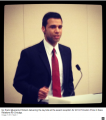 There is perhaps no greater challenge facing our country than the pursuit of equality. From gender, to socio-economic background, to color to race, the challenges we face not only exist today but have existed for hundreds of years.  Princeton and its alumni recognize that the issue of race relations continues to be urgent and recently started the Princeton Prize Race Relations to tackle the challenge of race. The event in Chicago was organized by friend and colleague Marquis Parker.
There is perhaps no greater challenge facing our country than the pursuit of equality. From gender, to socio-economic background, to color to race, the challenges we face not only exist today but have existed for hundreds of years.  Princeton and its alumni recognize that the issue of race relations continues to be urgent and recently started the Princeton Prize Race Relations to tackle the challenge of race. The event in Chicago was organized by friend and colleague Marquis Parker.
The mission of the Princeton Prize is “To promote harmony, understanding, and respect among people of different races by identifying and recognizing high school age students whose efforts have had a significant, positive effect on race relations in their schools or communities.â€Â
The Princeton Prize in Race Relations consists of regionally awarded $1,000 cash awards as well as an annual symposium on race.
The event took place yesterday and I was fortunate to be invited. Not only did I meet the high school award winners, support the Princeton community in Chicago and talk about Education Matters but I also gave the keynote address, which was on Race Relations as I see it today.
 “We the people, in order to form a more perfect union.â€Â The first words of the preamble and an early quote in my remarks. I spoke about many topics, from the town halls of Philadelphia PA where the constitution was written, to the DREAM’ers not given the chance to go to college even though they were born in the United States, to our responsibility to stand up and disagree not just on the streets but also in the classrooms and courtrooms, to the professional challenges of race today. I also told my own story – how I am the son of two adopted parents. Neither my mother or my father knows the exact color of their parents skin or what countries their ancestors came from – and ended  with a piece of advice to the winners: understand how much #EducationMatters in this process.
“We the people, in order to form a more perfect union.â€Â The first words of the preamble and an early quote in my remarks. I spoke about many topics, from the town halls of Philadelphia PA where the constitution was written, to the DREAM’ers not given the chance to go to college even though they were born in the United States, to our responsibility to stand up and disagree not just on the streets but also in the classrooms and courtrooms, to the professional challenges of race today. I also told my own story – how I am the son of two adopted parents. Neither my mother or my father knows the exact color of their parents skin or what countries their ancestors came from – and ended  with a piece of advice to the winners: understand how much #EducationMatters in this process.
But more important than those remarks were the wonderful efforts of the 4 award winners in attendance.  HERE is the video of this year’s winner, which was posted before the event. But all 4 students at the event were incredibly remarkable. They have businesses that reach all over the world and were very impressive in front of the room to only be 16 and 17 years old.
The 2013 VIVA Event #EducationMatters
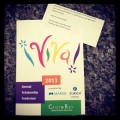 Every year hundreds of people attend Cristo Rey high school’s annual VIVA! scholarship fundraiser at Millennium Park. I recently got an invite for me and a guest again this year’s event.
Every year hundreds of people attend Cristo Rey high school’s annual VIVA! scholarship fundraiser at Millennium Park. I recently got an invite for me and a guest again this year’s event.
VIVA  is a day of inspiration to reflect on how well the school has done. A day of celebration for the school’s former students and employees. And a day of participation, not only for volunteers wanting to get more involved but also for people in Chicago.
The event will be filled with food, fun, friends and networking. There will be a great raffle, music and announcements. There will also be high profile speakers and news coverage. I look forward to the event.
To learn more about VIVA click here.
To purchase tickets to VIVA click here.
To see my posts about the event the last two years, see below.
2011 Event:Â http://www.jeremycwilson.com/2011/05/cristo-rey-high-school-viva-and-the-education-industry/
2012 Event:Â http://www.jeremycwilson.com/2012/05/cristo-reys-2012-viva-fundraiser/
2013 World Scholars Gala knows that #EducationMatters
 Later today, on Saturday March 30, 2013, I’ll join people from all over Chicago in a wonderful event to support one of the most important issues in Chicago today – education.  This evening the event is the Village Leadership Academy Gala.
Later today, on Saturday March 30, 2013, I’ll join people from all over Chicago in a wonderful event to support one of the most important issues in Chicago today – education.  This evening the event is the Village Leadership Academy Gala.
The 2013 World Scholars Program Gala takes place tonight, March 30th in Chicago.  I’ll be attending with good friend and education extraordinaire, Marquis Parker  who has access to the event as a VP at Aon, as well as a few other  friends and colleagues, including Louis Dobson, SVP at Aon. Most people will bring a special guest to the event.
With the education being such a major issue in Chicago, there’s never been a better time to bring everyone together in the same room. To discuss the issues.  Learn about this organization. And to not only to enjoy the evening but also to eventually work together to have a bigger voice in the education movement today.
There’s never been a more pivotal time to move our country forward through eduction.
CLICK HERE to learn more about the World Scholars Program.
Click here to learn more about our #EducationMatters campaign and HERE to read the education mission.
Full Text Of Obama’s 2013: Inaugural Address
 Here is text of the 2013 Inaugural Address.Words are those prepared for delivery and provided by the White House.
Here is text of the 2013 Inaugural Address.Words are those prepared for delivery and provided by the White House.
And below that my favorite quote of the day #EducationMatters
Vice President Biden, Mr. Chief Justice, Members of the United States Congress, distinguished guests, and fellow citizens:
Each time we gather to inaugurate a president, we bear witness to the enduring strength of our Constitution. We affirm the promise of our democracy. We recall that what binds this nation together is not the colors of our skin or the tenets of our faith or the origins of our names. What makes us exceptional – what makes us American – is our allegiance to an idea, articulated in a declaration made more than two centuries ago:
“We hold these truths to be self-evident, that all men are created equal, that they are endowed by their Creator with certain unalienable rights, that among these are Life, Liberty, and the pursuit of Happiness.â€
Today we continue a never-ending journey, to bridge the meaning of those words with the realities of our time. For history tells us that while these truths may be self-evident, they have never been self-executing; that while freedom is a gift from God, it must be secured by His people here on Earth. The patriots of 1776 did not fight to replace the tyranny of a king with the privileges of a few or the rule of a mob. They gave to us a Republic, a government of, and by, and for the people, entrusting each generation to keep safe our founding creed.
For more than two hundred years, we have.
Through blood drawn by lash and blood drawn by sword, we learned that no union founded on the principles of liberty and equality could survive half-slave and half-free. We made ourselves anew, and vowed to move forward together.
Together, we determined that a modern economy requires railroads and highways to speed travel and commerce; schools and colleges to train our workers.
Together, we discovered that a free market only thrives when there are rules to ensure competition and fair play.
Together, we resolved that a great nation must care for the vulnerable, and protect its people from life’s worst hazards and misfortune.
Through it all, we have never relinquished our skepticism of central authority, nor have we succumbed to the fiction that all society’s ills can be cured through government alone. Our celebration of initiative and enterprise; our insistence on hard work and personal responsibility, are constants in our character.
But we have always understood that when times change, so must we; that fidelity to our founding principles requires new responses to new challenges; that preserving our individual freedoms ultimately requires collective action. For the American people can no more meet the demands of today’s world by acting alone than American soldiers could have met the forces of fascism or communism with muskets and militias. No single person can train all the math and science teachers we’ll need to equip our children for the future, or build the roads and networks and research labs that will bring new jobs and businesses to our shores. Now, more than ever, we must do these things together, as one nation, and one people.
This generation of Americans has been tested by crises that steeled our resolve and proved our resilience. A decade of war is now ending. An economic recovery has begun. America’s possibilities are limitless, for we possess all the qualities that this world without boundaries demands: youth and drive; diversity and openness; an endless capacity for risk and a gift for reinvention.  My fellow Americans, we are made for this moment, and we will seize it – so long as we seize it together.
For we, the people, understand that our country cannot succeed when a shrinking few do very well and a growing many barely make it. We believe that America’s prosperity must rest upon the broad shoulders of a rising middle class. We know that America thrives when every person can find independence and pride in their work; when the wages of honest labor liberate families from the brink of hardship. We are true to our creed when a little girl born into the bleakest poverty knows that she has the same chance to succeed as anybody else, because she is an American, she is free, and she is equal, not just in the eyes of God but also in our own.
We understand that outworn programs are inadequate to the needs of our time. We must harness new ideas and technology to remake our government, revamp our tax code, reform our schools, and empower our citizens with the skills they need to work harder, learn more, and reach higher. But while the means will change, our purpose endures: a nation that rewards the effort and determination of every single American. That is what this moment requires. That is what will give real meaning to our creed.
We, the people, still believe that every citizen deserves a basic measure of security and dignity. We must make the hard choices to reduce the cost of health care and the size of our deficit. But we reject the belief that America must choose between caring for the generation that built this country and investing in the generation that will build its future. For we remember the lessons of our past, when twilight years were spent in poverty, and parents of a child with a disability had nowhere to turn. We do not believe that in this country, freedom is reserved for the lucky, or happiness for the few. We recognize that no matter how responsibly we live our lives, any one of us, at any time, may face a job loss, or a sudden illness, or a home swept away in a terrible storm. The commitments we make to each other – through Medicare, and Medicaid, and Social Security – these things do not sap our initiative; they strengthen us. They do not make us a nation of takers; they free us to take the risks that make this country great.
We, the people, still believe that our obligations as Americans are not just to ourselves, but to all posterity. We will respond to the threat of climate change, knowing that the failure to do so would betray our children and future generations. Some may still deny the overwhelming judgment of science, but none can avoid the devastating impact of raging fires, and crippling drought, and more powerful storms. The path towards sustainable energy sources will be long and sometimes difficult. But America cannot resist this transition; we must lead it. We cannot cede to other nations the technology that will power new jobs and new industries – we must claim its promise. That is how we will maintain our economic vitality and our national treasure – our forests and waterways; our croplands and snowcapped peaks. That is how we will preserve our planet, commanded to our care by God. That’s what will lend meaning to the creed our fathers once declared.
We, the people, still believe that enduring security and lasting peace do not require perpetual war. Our brave men and women in uniform, tempered by the flames of battle, are unmatched in skill and courage. Our citizens, seared by the memory of those we have lost, know too well the price that is paid for liberty. The knowledge of their sacrifice will keep us forever vigilant against those who would do us harm. But we are also heirs to those who won the peace and not just the war, who turned sworn enemies into the surest of friends, and we must carry those lessons into this time as well.
We will defend our people and uphold our values through strength of arms and rule of law. We will show the courage to try and resolve our differences with other nations peacefully – not because we are naïve about the dangers we face, but because engagement can more durably lift suspicion and fear. America will remain the anchor of strong alliances in every corner of the globe; and we will renew those institutions that extend our capacity to manage crisis abroad, for no one has a greater stake in a peaceful world than its most powerful nation. We will support democracy from Asia to Africa; from the Americas to the Middle East, because our interests and our conscience compel us to act on behalf of those who long for freedom. And we must be a source of hope to the poor, the sick, the marginalized, the victims of prejudice – not out of mere charity, but because peace in our time requires the constant advance of those principles that our common creed describes: tolerance and opportunity; human dignity and justice.
We, the people, declare today that the most evident of truths – that all of us are created equal – is the star that guides us still; just as it guided our forebears through Seneca Falls, and Selma, and Stonewall; just as it guided all those men and women, sung and unsung, who left footprints along this great Mall, to hear a preacher say that we cannot walk alone; to hear a King proclaim that our individual freedom is inextricably bound to the freedom of every soul on Earth.
It is now our generation’s task to carry on what those pioneers began. For our journey is not complete until our wives, our mothers, and daughters can earn a living equal to their efforts. Our journey is not complete until our gay brothers and sisters are treated like anyone else under the law – for if we are truly created equal, then surely the love we commit to one another must be equal as well. Our journey is not complete until no citizen is forced to wait for hours to exercise the right to vote. Our journey is not complete until we find a better way to welcome the striving, hopeful immigrants who still see America as a land of opportunity; until bright young students and engineers are enlisted in our workforce rather than expelled from our country. Our journey is not complete until all our children, from the streets of Detroit to the hills of Appalachia to the quiet lanes of Newtown, know that they are cared for, and cherished, and always safe from harm.
That is our generation’s task – to make these words, these rights, these values – of Life, and Liberty, and the Pursuit of Happiness – real for every American. Being true to our founding documents does not require us to agree on every contour of life; it does not mean we will all define liberty in exactly the same way, or follow the same precise path to happiness. Progress does not compel us to settle centuries-long debates about the role of government for all time – but it does require us to act in our time.
For now decisions are upon us, and we cannot afford delay. We cannot mistake absolutism for principle, or substitute spectacle for politics, or treat name-calling as reasoned debate. We must act, knowing that our work will be imperfect. We must act, knowing that today’s victories will be only partial, and that it will be up to those who stand here in four years, and forty years, and four hundred years hence to advance the timeless spirit once conferred to us in a spare Philadelphia hall.
My fellow Americans, the oath I have sworn before you today, like the one recited by others who serve in this Capitol, was an oath to God and country, not party or faction – and we must faithfully execute that pledge during the duration of our service. But the words I spoke today are not so different from the oath that is taken each time a soldier signs up for duty, or an immigrant realizes her dream. My oath is not so different from the pledge we all make to the flag that waves above and that fills our hearts with pride.
They are the words of citizens, and they represent our greatest hope.
You and I, as citizens, have the power to set this country’s course.
You and I, as citizens, have the obligation to shape the debates of our time – not only with the votes we cast, but with the voices we lift in defense of our most ancient values and enduring ideals.
Let each of us now embrace, with solemn duty and awesome joy, what is our lasting birthright. With common effort and common purpose, with passion and dedication, let us answer the call of history, and carry into an uncertain future that precious light of freedom.
Thank you, God Bless you, and may He forever bless these United States of America.
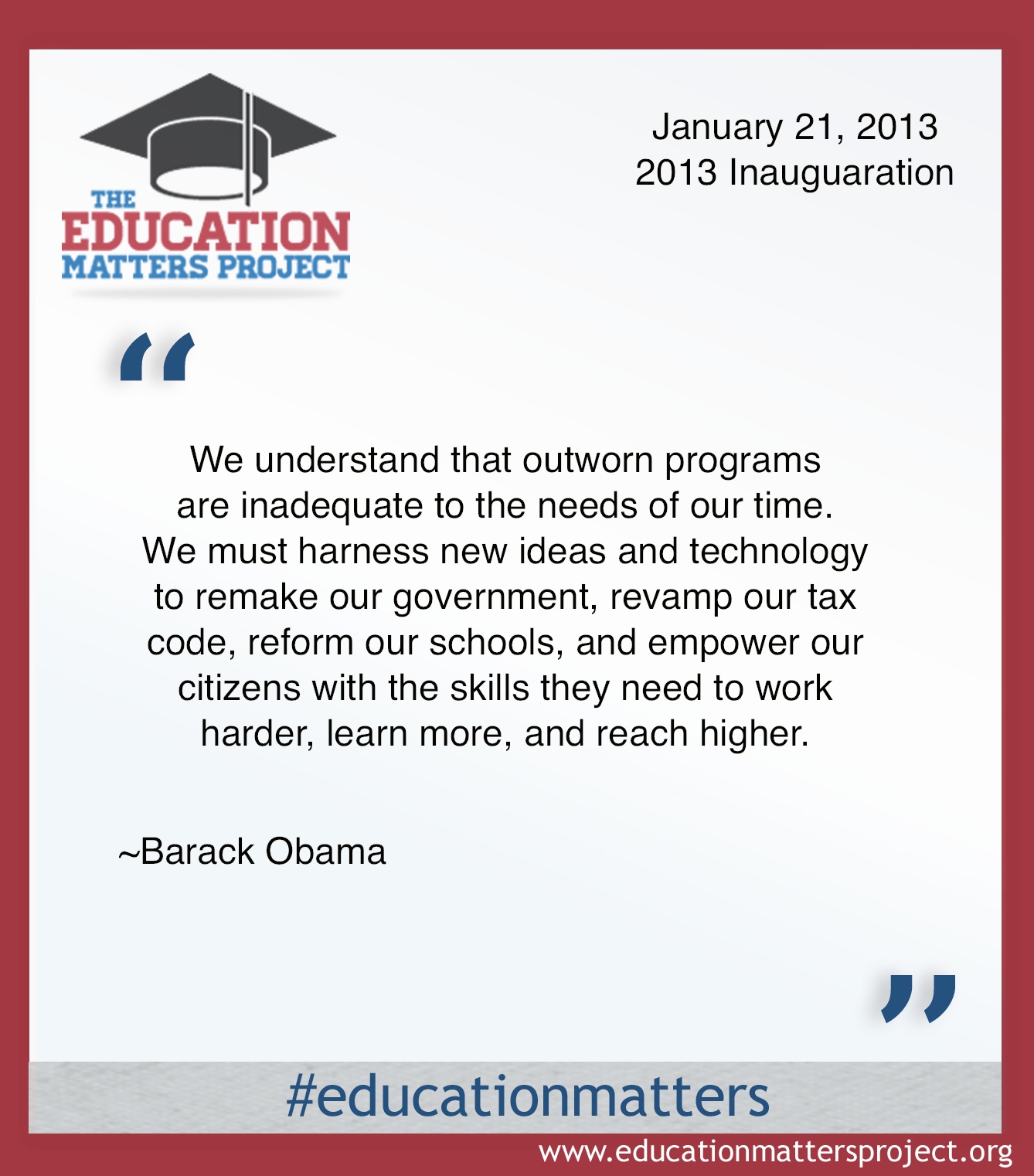
#EducationMatters
Please Vote
Recent Posts
Twitter Feed
Disclaimer
| S | M | T | W | T | F | S |
|---|---|---|---|---|---|---|
| « Jun | ||||||
| 1 | 2 | |||||
| 3 | 4 | 5 | 6 | 7 | 8 | 9 |
| 10 | 11 | 12 | 13 | 14 | 15 | 16 |
| 17 | 18 | 19 | 20 | 21 | 22 | 23 |
| 24 | 25 | 26 | 27 | 28 | 29 | 30 |

